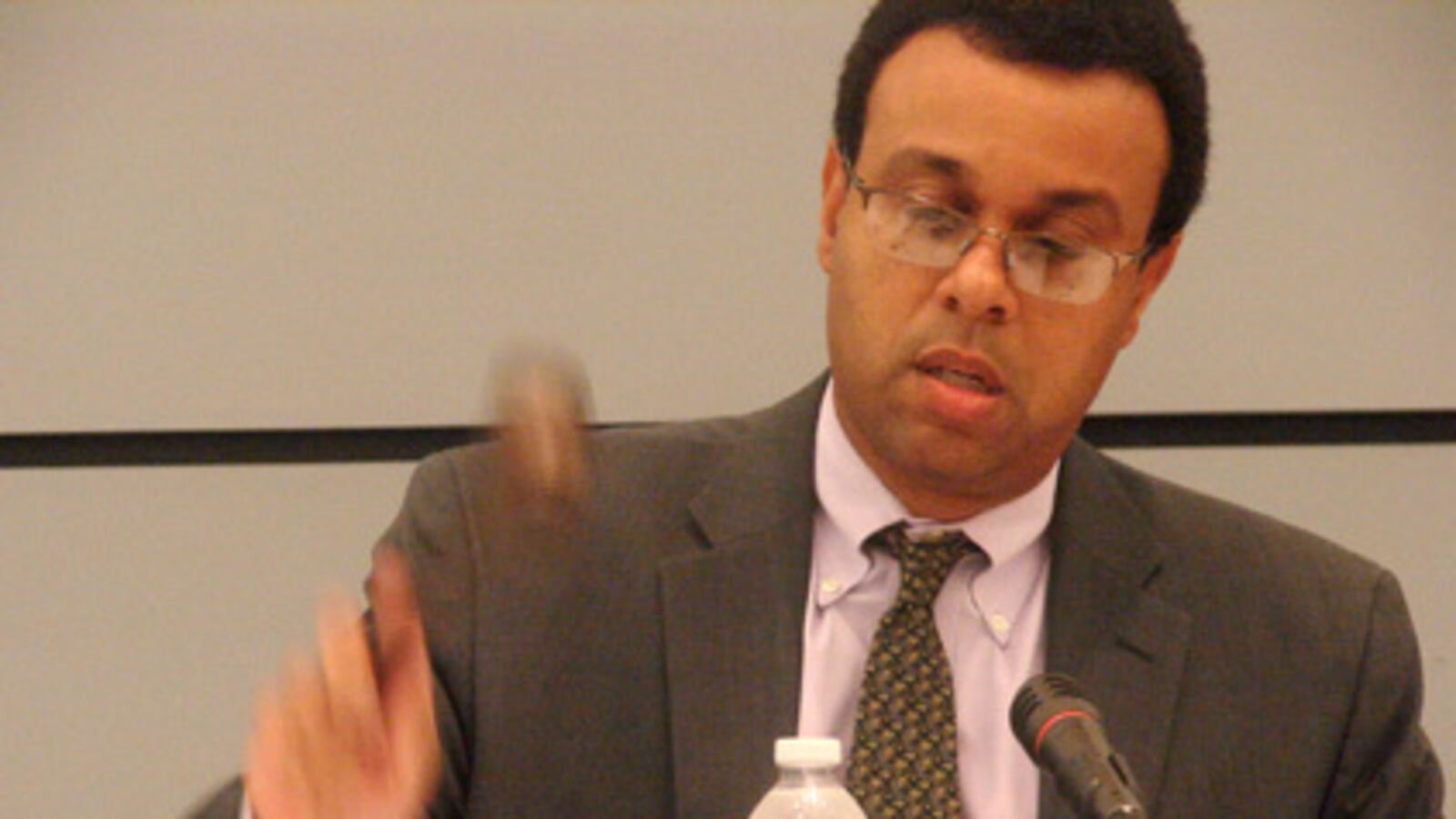This article was originally published in The Notebook. In August 2020, The Notebook became Chalkbeat Philadelphia.
Updated 7:30 p.m.
Still in the midst of a significant makeover, the School Reform Commission met Wednesday with two empty seats, a new chairman, and two new "executive advisors" closely observing their work.
Wednesday morning, Gov. Tom Corbett announced that he will name his most recent nominee, Pedro Ramos, as SRC chair. Senate confirmation of Ramos’ nomination, however, is not expected until later this month. In the meantime, Corbett announced, new mayoral appointee Wendell Pritchett will serve as interim chair.
Just hours after the announcement, Pritchett presided over his first meeting with the SRC, the group’s twice-delayed September voting meeting.
“I’m honored and humbled by this position – and also intimidated,” said Pritchett, who is chancellor at Rutgers-Camden.
Pritchett acknowledged that the SRC is facing "major challenges."
Issues confronting the body include tens of millions of dollars in budget cuts that still need to be implemented, the possibility of widespread school closings, and a deep reserve of public mistrust following revelations of political interference and backroom dealing on a potentially lucrative charter contract at Martin Luther King High.
Parent Christine Carlson was one of several speakers to raise concerns about how the SRC does business.
"I’m asking you to tell me, what you have learned from past occurrences and what is going to be different?" said Carlson during public testimony.
Pritchett told her that the commission would "commit to act in an open and transparent manner." Neither Joseph Dworetzky or Denise McGregor Armbrister, who have both served on the commission for over a year, responded directly to Carlson.
John J. Krol, a long-time mechanic for the District, also testified that he encountered intimidation when he signed up to speak to the SRC about the 1,300 layoff notices received by members of the union representing maintenance employees. He said two different central office staffers tried to dissuade him from speaking before the body.
"I feel I should be able to speak freely and openly with the matter of these layoffs," said Krol.
After the meeting, Pritchett spoke with reporters – a pointed departure from the practice of his predecessor, Robert Archie – and addressed the issue of skepticism about the commission’s transparency and responsiveness to public input.
"I understand that is a big concern," said Pritchett. "We commit as a commission to work in an open and transparent manner. We have to get the public’s respect and trust in this process."
He declined to identify specific practices that might change, however, saying that the SRC needed to be fully constituted with five commissioners before any such decisions could be made.
Pritchett also introduced the District’s two new “executive advisors,” named yesterday by Mayor Michael Nutter and Pennsylvania education secretary Ronald Tomalis to provide support and informal oversight to the SRC and to Acting Superintendent Leroy Nunery.
Both Lori Shorr, who is Nutter’s chief education officer, and Ed Williams, a former District administrator appointed by the state, addressed the audience.
“I’m thrilled to be part of this partnership. It is the first time that you will see the School District, the state, and the city all coming together to create a vision and a plan for Philadelphia students,” said Williams.
Shorr, who will continue her responsibilities for the mayor while also filling her new role, said after the meeting that she had spent the entire day in her new office at District headquarters at 440 North Broad Street. She said that greater oversight of the commissioners by their appointing authorities could help restore public trust.
"You now have a mayor and a governor who are taking more responsibility for the actions of the SRC in a way that they didn’t before," said Shorr.
Nunery said he welcomed the input of his new "executive advisors," as well as a new "working group" charged with reviewing the District’s financial and operational practices. Nunery stressed that he did not see the move as demonstrating a lack of faith in his leadership, which he said would be focused on “rebuilding the culture” of the District after a tumultuous last year.
“We need to heal, there’s no question about it,” said Nunery.
In the weeks ahead, the District must also implement a “gap closing plan” to address what remains of a $600-plus million budget shortfall, and is slated to moved forward with its facilities master planning process, which could result in dozens of school closings.
"Everybody knows that [school closings and other facilities changes] are something that is long overdue. It’s been hard to the city to take up in previous years, and it’s not going to be any easier now," said Dworetzky.
Armbrister said she wanted to make sure the commission also focuses this year on "climate and decorum in our schools."
"That’s something that troubles me," she said.
Education consultant and longtime SRC-watcher Venard Johnson said afterward that the new leadership of the commission should be given some time "to get a grip on things," but voiced what seems to be a widespread sentiment about the ongoing changes in District leadership.
"We need to see: Will they really begin to open up to hear parent and community input?" said Johnson.
The SRC planing meeting previously scheduled for October 12 has been cancelled. This month’s action meeting has been moved from October 19 to October 26.
A second mayoral appointee is expected soon.
Benjamin Herold’s report for WHYY.

